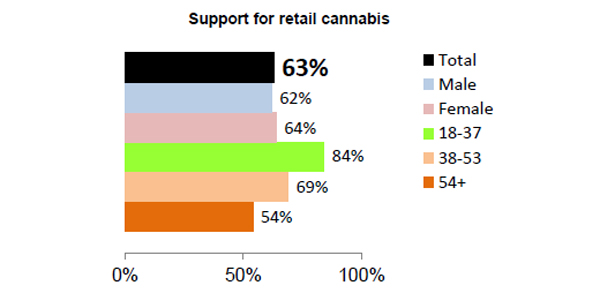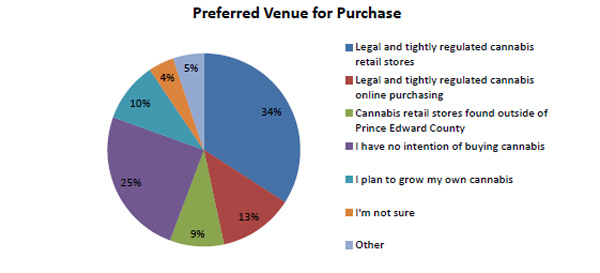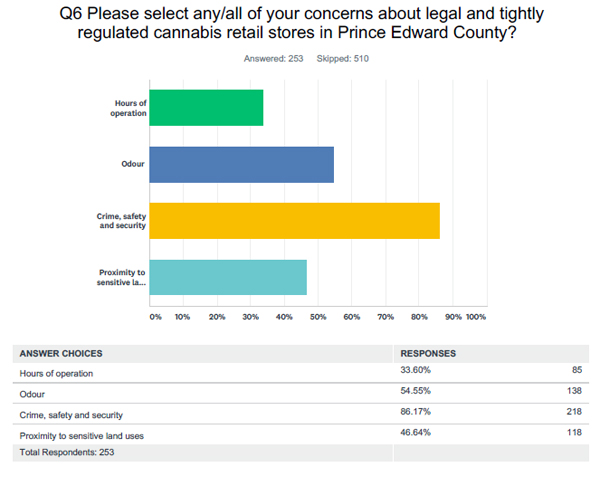Survey says – County should allow retail cannabis stores
Administrator | Jan 07, 2019 | Comments 0
With survey results showing 63 per cent of County residents support legal and tightly regulated cannabis in the municipality, County staff are recommending council permit retail locations within Prince Edward County.
The municipality’s Community Development Department report indicates support was wide-spread despite significant generational differences, and that 54 per cent of County residents have used cannabis at least once in the past. While 59 per cent are lapsed, one in five residents (20 per cent) are currently regular or occasional users.
– 76 per cent of residents aged 18-53 (GenZ, GenY and GenX) support cannabis retail.
– Youngest residents were most supportive at 84 per cent.
– Just over half – 54 per cent – of Boomers and War Gen residents support retail cannabis
– Gender differences on an aggregate level are negligible, but females are driving support within the two youngest age ranges.
One third of the entire 18+ population surveyed intend to purchase cannabis, which, the report states, represents a larger than anticipated constituency.
The report, to be presented Wednesday night during a special Committee of the Whole meeting, examines results of the public consultation surveys by telephone, online and in writing. The public is welcome to attend at 7 p.m. at the Prince Edward Community Centre, 375 Main St., Picton.
Cannabis currently can only be bought legally online and Ontario municipalities have until Jan 22 to decide if they will allow private stores to open next spring.
The province plans to award no more than 25 retail licenses for April 1, 2019, due to supply shortages Canada-wide. Additional licences are to follow as supply increases. All qualified retail license applicants will be entered into a lottery administered via a third party organization to determine the initial licensed businesses with the caveat that licenses are to be equitably distributed across the province. Any business applying for a license would have to post notice at the location and comments could be received by the Alcohol and Gaming Commission of Ontario (AGCO) for 15 days from the public and municipality before a decision is made.
Council on Nov. 15, directed staff to conduct three types of public consultation to gauge community sentiment on the issue – a public consultation page on the municipal website, a telephone survey and special meeting of council for public feedback to be held Tuesday, Jan. 15 at Shire Hall to ratify council’s position.
A third party telephone survey goal was to mirror the population demographics from the 2016 Census in terms of generation and sex. A mix of 30 / 70 responses from mobile phones to landline calls were made.
The Community Development Department report indicates the company was able to get responses from a community sample size of 350 full and part-time residents to make the study regionally representative, deriving a confidence interval of +/- 5 per cent, 19 times out of 20.
The report notes respondents ages 38 and over were more accessible and engaged in the process and as expected, the youngest cohort quota was more difficult to meet, but large enough that the appropriate weighting of the responses would provide a scientifically accurate picture of the community sentiment.
Captured and reported but not subject to a quota were the ward, rural/settlement and full/part-time resident representations. The report states 98 per cent of the interviews were conducted with full-time residents. A stronger response rate of 60 per cent from rural residents comes close to mirroring the current demographic breakdown of the community.
Respondents to the interview were able to opt out of answering any of the questions with the exception of Question 4 – “Do you support or oppose legal and tightly regulated cannabis retail stores in Prince Edward County?” since public sentiment to this question was the key objective of the consultation.

While support is widespread, residents do have concerns – chief among them in the live interviews was proximity to day cares and schools. Current licensing calls for a minimum buffer of 150 meters from a sensitive land use like a school and municipalities are prohibited from altering the buffer.
“Not surprisingly, the County’s younger residents (aged 18-37) drive those with “no concerns” while those aged 38+ were more prone to register concern; particularly driven by residents aged 54+,” states Todd Davis, Community Development Supervisor, in his report. “While the current ‘yes’ or ‘no’ to the Province of Ontario is not linked to any provisos or preferences per municipality these are important considerations for communication to community residents,” he states.
An additional area of interest surrounded purchase intention and venue.

Seventy percent of residents who intend to purchase cannabis expect to do so at retail stores in the County. This represents less than one quarter (22 per cent) of the total 18+ population.
In addition, the report states:
– Bricks and mortar retail is by far the preferred venue for County residents; seven in 10 expect to purchase at County stores.
– Tyendinaga has the potential to draw 21 per cent of the local cannabis market away from PEC, while online looks to draw another nine per cent.
– One third of the entire 18+ population intend to purchase cannabis, which the report states represents a larger than anticipated constituency.
There were 750 respondents to the municipal online survey and the County reports results did not deviate significantly from the telephone survey.
– 65.8 per cent supported retail cannabis; 26.91 opposed and 6.29 were neutral.
– 38 per cent had concerns about retail cannabis – 86.17 per cent related to crime, safety and security; followed by 54.55 per cent on odour; 46.64 per cent on proximity to sensitive land uses and 33.6 per cent over hours of operation.

The full report is available on the County’s website.
If approved by council, the municipality would share in $30 million set aside by the Ontario government to assist with the transition to legal cannabis.
Provincial funding will result in a first payment of $34,750 and second payments equal to or greater than the first payment should the municipality permit retail stores. Further funds could be available provided that more than $100 million in federal excise duty is collected on legal cannabis.
Opting out would result in the second payment being reduced to $5,000 and ineligibility for any further funds, even if the municipality permits retail cannabis in the future.
Municipalities must use the funding to address the implementation costs that directly relate to the legalization of recreational cannabis. Examples of permitted costs include:
• increased enforcement (e.g., police, public health and by-law enforcement, court administration, litigation);
• increased response to public inquiries (e.g., 311 calls, correspondence);
• increased paramedic services; increased fire services; and
• bylaw / policy development (e.g., police, public health, workplace safety policy).
Filed Under: Local News
About the Author:






























